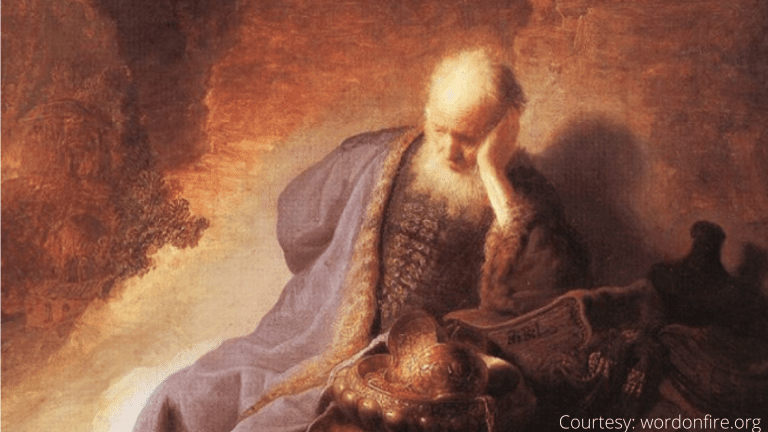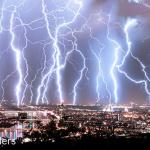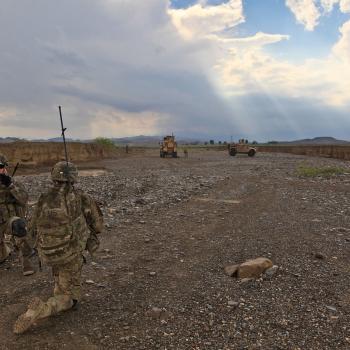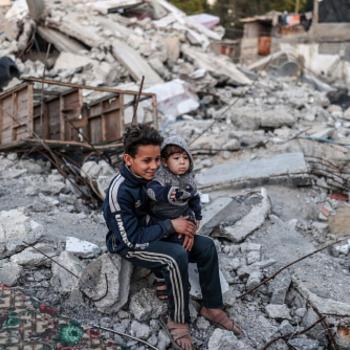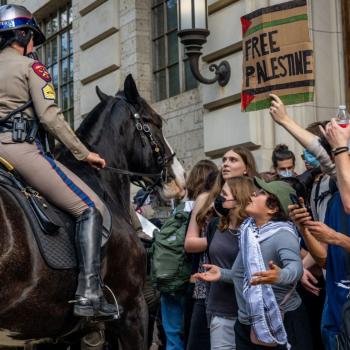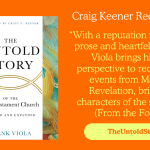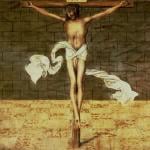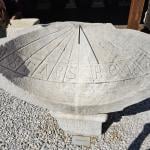Monday: Read Revelation 2:18-29
The message to the church in Thyatira forms the center of the seven messages. Note that this message contains the strongest representation and rejection of idolatry in all of the messages.
Unfortunately, those in Thyatira have also succumbed to a “prophetic” voice (Jezebel) within their community (20). This “Jezebel” was likely encouraging the people of God in Thyatira to participate in pagan festivals in honor of the various patron deities. John views such activities as being in accord with “the deep things of Satan” (24).
It is important for us to recognize that one of the more significant threats among the seven churches came from within. Several of the messages warn of false teachers who were encouraging the communities of Christ-followers that it was okay to compromise with the pagan gods and attend the various feasts. The temptation to do so was great because assimilation in the local culture provided the average person in the Roman world with the hope that they might be able to “buy and sell” (13:17) in the fragile Roman economy. For John, however, there was no place for compromise. Either Jesus is Lord or Rome is.
It is also important to observe that five of the seven messages begin with “I know your works” (2:2, 19; 3:1, 8, 15: every message except Smyrna and Pergamum). In fact, John uses “works” twelve times in the seven messages (2:2, 5, 6, 19*, 22, 23, 26; 3:1, 2, 8, 15). This indicates that Jesus was concerned with the churches’ works. The importance of works among the churches is highlighted by the fact that the message to Thyatira, which functions as the central message of the seven, adds to the exhortation to the one “who overcomes and he who keeps My deeds until the end” (26).
Questions to ponder/discuss:
- After reading the message to the church in Thyatira, what do you think is the significance of the fact that Jesus is “The Son of God, who has eyes like a flame of fire, and His feet are like burnished bronze” (18)?
- What do you think is the significance that the word “works” occurs twelve times in the seven messages and that “works” are highlighted in this message?
- One of the most significant questions in John’s mind was “to whom do you give allegiance”? We cannot overestimate how great the need to compromise with the Roman system in order to secure food and basic necessities was for those in the seven churches. John, however, views allegiance, or compromise with Rome, as undermining the Gospel that Jesus is the world’s true King. What do you think this conflict looks like in your context?
Tuesday: Read Revelation 3:1-6
I noted that the messages to Smyrna and Philadelphia had no negative features. Well, the messages to Sardis and Laodicea are similar except that they have no positive features. There is the concession in this message that there are “a few people in Sardis who have not soiled their garments” (3:4), but that is the best we get from this church.
What was the specific problem in the church in Sardis? The indication may be found in the depiction of Jesus given at the opening of the message. The title for Jesus in the message to Sardis is “He who has the seven Spirits of God and the seven stars” (1). This description of Jesus loosely parallels the title used in the message to Ephesus (2:1). The parallel with the message to Ephesus suggests that the failure of the church in Sardis was also that their love and witness were either ineffective or, more likely, lacking altogether.
The message to the church in Sardis then is that Jesus sees that they “have received and heard” (3) the Word, and now exhorts them to “keep it, and repent” (3).
The message to Sardis then adds a warning: “if you do not wake up, I will come like a thief, and you will not know at what hour I will come to you” (3). As with Ephesus, the threat of coming judgment upon those in Sardis appears to correspond to their lack of love and their ineffective witness.
Questions to ponder/discuss:
- After reading the message to the church in Sardis, what do you think is the significance of the fact that Jesus is the One “who has the seven Spirits of God and the seven stars”?
- It appears to be noteworthy that the churches of Sardis and Laodicea were in cities that were among the wealthiest of the seven cities. The two churches that had no positive features were the two most affluent churches. What do you think is the significance of this?
Wednesday: Read Revelation 3:7-13
The church in Philadelphia was, along with the church in Smyrna, one of the two churches with only positive features.
The primary context behind this message is that they were facing opposition from the local synagogue which appears to have been shutting them out of the local communal gatherings. Thus, Jesus is introduced as “He who is holy, who is true, who has the key of David, who opens and no one will shut, and who shuts and no one opens” (7). That they were being shut out of their local synagogues also accounts for why they are encouraged with the words, “I have put before you an open door which no one can shut” (8). And this likely accounts for the words of promise given to those who overcome in Philadelphia, “I will make him a pillar in the temple of My God, and he will not go out from it anymore” (12). Jesus, in other words, assures them that He will never shut them out.
Questions to ponder/discuss:
- After reading the message to the church in Philadelphia, what do you think is the significance of the fact that Jesus is “He who is holy, who is true, who has the key of David, who opens and no one will shut, and who shuts and no one opens”?
- That both the churches in Philadelphia and Smyrna were either undergoing or about to undergo persecution and that they are the two churches that have no negatives should speak volumes to the modern reader of the book of Revelation. What do you think is the significance of the fact that both of the churches that have only positive features are facing persecution?
Thursday: Read Revelation 3:14-22
As the last of the seven messages, the message to Laodicea enjoys a measure of prominence. That prominence is evident in the final promise for the one who overcomes: “I will give to that person to sit down with Me on My throne, just as I overcame and sat down with My Father on His throne” (21). The overcomers will not only reign with Christ, but they will sit as rulers on Christ’s throne with Him – just as He sits on the Father’s throne.
Unfortunately, as I noted previously, the church in Laodicea, though they thought they were doing well, was not doing well. Thus, they claimed, “I am rich, and have become wealthy, and have need of nothing,” (17) and yet Jesus warns them, “and you do not know that you are wretched and miserable and poor and blind and naked” (17).
The historical, geographical, and cultural context of Laodicea is especially helpful for understanding this message. The city was famous for its banking institutions. Nonetheless, despite their wealth, Jesus says that the church is “poor” and He advises them “to buy from Me gold refined by fire in order that you may become rich” (3:18).
Laodicea was also home to some well-known textile industries, which included the manufacturing of widely-distributed clothing. Ironically, Jesus informs them that they are “naked” and He advises them “to buy from Me . . . white garments in order that you may clothe yourself” (3:18).
In addition, Laodicea was home to a well-known medical school that had produced an eye salve that was known to reverse some of the effects of blindness. The church, despite their own medical abilities, was actually “blind” (3:17). As a result, they were advised, “to buy from Me . . . eye salve to anoint your eyes in order that you may see” (3:18).
Questions to ponder/discuss:
- After reading the message to the church in Laodicea, what do you think is the significance of the fact that Jesus is
- The church in Laodicea may well have been in the worst condition of all the churches. They were “wretched and pitiable and poor and blind and naked” (17). The problem was exacerbated by the fact that they do not realize that there are any In fact, they were saying, “I am rich, and have prospered, and I have need of nothing” (17). In light of all this, the Laodiceans are urged to repent (20).
- This message brings to the fore a number of questions pertaining to the contemporary Western church. We have seen that the wealthy churches (Sardis and Laodicea) were not doing well—no positive features were mentioned. How does this speak of the church in affluent areas today? This stands in stark contrast to those in the church in Smyrna, which has only words of affirmation and yet they were in “poverty” (2:9). The fact that the poor in Smyrna are deemed “rich” and those in Laodicea are “wretched and pitiable and poor and blind and naked” (3:17) should draw the attention of modern Western readers.
- Though 3:20 is often used to describe Jesus as waiting to enter the heart of the unbeliever, the context suggests that Jesus’ invitation here is for those in the church in Laodicea to repent. What do you think is the significance of this?
Friday: Read Revelation 4:1-11: Ezekiel 1
It is critical for understanding the book of Revelation that we recognize that John is narrating a story, or perhaps it is better to note that there are two highly interconnected stories.
The first story was found in 1:9-3:22 and in it, John relays that he saw Jesus who told him to write to the seven churches (1:9-20). In 2:1-3:22, John does just that. After reading the end of the message to Laodicea (3:22), we should expect the book of Revelation to end. After all, once John has finished writing the seven messages, the story is complete.
In 4:1, John is suddenly taken to heaven and another story breaks out. This story depicts what John saw as he was taken into heaven (4:1-16:21).
The second story begins with a heavenly “worship” scene (4:1-5:14). This scene is critical to understanding the message of the book of Revelation. Primarily, it establishes that God is sovereign: He is the One who is sitting on the throne (2) and not Caesar!
As we continue through the second story, there are two key questions that will be answered: First, what is needed to so that the throne of God, which is in heaven in 4:1-11, can come down to the earth (or to the New Creation)—as it does in 21:9-22:9? Second, how are the nations redeemed?
Questions to ponder/discuss:
- Reflecting on today’s reading, what stands out the most to you?
- Whether we like it or not, the book of Revelation is very political. Then again, so are the Gospels and the rest of the NT. The message of the NT includes the proclamation that Jesus is the true King! Do you see any conflicts with the proclamation that Jesus is the King and not Caesar in your present context? What does realizing this mean for how you live out each day?
- After reading Ezekiel 1, what parallels do you notice with Rev 4:1-11?


